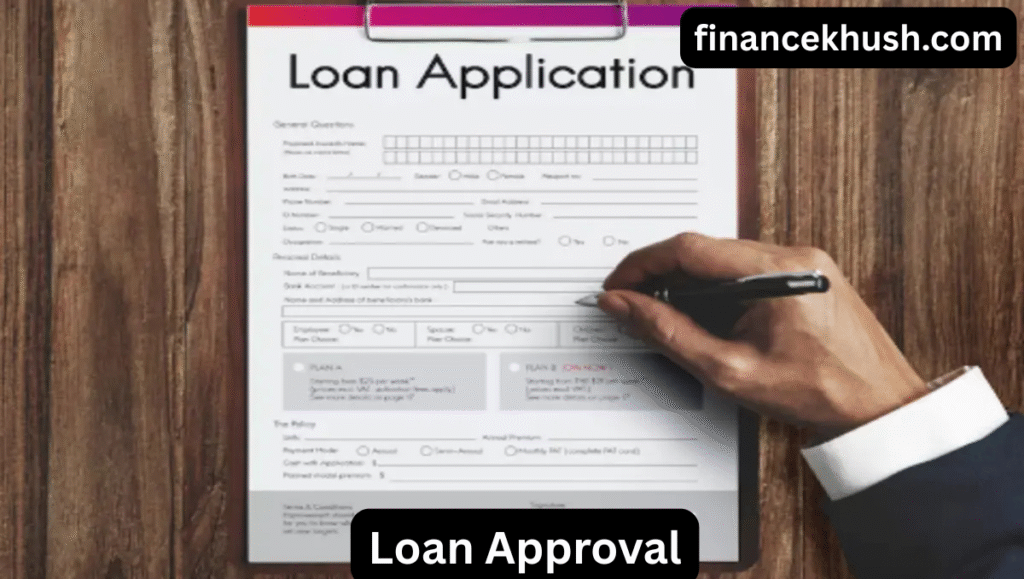Loan approval is the process where a lender decides whether to give you a loan based on factors like your credit score, income, and financial history. When applying for a loan, the lender will review your ability to repay the amount you borrow. Having a good credit score, stable job, and low debt-to-income ratio can increase your chances of approval. If you’re approved, you’ll receive the loan with certain terms, like interest rates and repayment schedules. If not, don’t worry! You can work on improving your finances and try again with another lender in the future.
What is Loan Approval?
Loan approval is the process by which a lender evaluates your application and decides whether or not to lend you money. Lenders—whether they are banks, credit unions, or online lenders—review a variety of factors to determine if you are a suitable borrower.
The approval process involves several stages:
- Application: You submit a loan application, which includes details like how much you want to borrow and the purpose of the loan.
- Evaluation: The lender reviews your financial situation, including your credit score, income, employment history, and other factors.
- Decision: After assessing your application, the lender either approves or denies your loan request.
While the process may vary slightly depending on the lender and type of loan, this general framework applies across most loans.
Types of Loans and Their Approval Process
Before diving into the specifics of loan approval, it’s important to understand the different types of loans available. The loan approval process can vary depending on the type of loan you’re applying for.
1. Personal Loans
Personal loans are unsecured loans, meaning they don’t require collateral like a house or car. These loans are often used for things like debt consolidation, medical expenses, or home improvements. Because they are unsecured, personal loans tend to have higher interest rates than secured loans.
Approval Process for Personal Loans:
- Credit Score: Lenders typically check your credit score to gauge your ability to repay. A higher credit score usually means better approval chances.
- Income: Your income level helps lenders determine if you can afford monthly payments.
- Debt-to-Income Ratio (DTI): This ratio compares your monthly debt payments to your monthly income, helping lenders assess your financial capacity.
2. Home Loans (Mortgages)
A home loan, or mortgage, is a loan specifically for purchasing a home. Since a mortgage is a secured loan, the property itself acts as collateral. If you fail to make payments, the lender has the right to foreclose on the property.
Approval Process for Home Loans:
- Credit Score: A good credit score is crucial. Most lenders prefer a score of 620 or higher, though a score of 740 or above may get you the best rates.
- Down Payment: The size of your down payment can significantly impact your loan approval. A higher down payment can make lenders feel more comfortable approving your loan.
- Income & Employment History: Lenders want to see steady income to ensure you can make monthly mortgage payments.
- Property Appraisal: Lenders usually require an appraisal to ensure the property’s value aligns with the loan amount.
3. Auto Loans
Auto loans are secured loans used to finance the purchase of a car. Similar to home loans, the vehicle acts as collateral.
Approval Process for Auto Loans:
- Credit Score: A higher credit score generally leads to a better interest rate.
- Down Payment: Making a down payment can lower the loan amount and may improve your approval odds.
- Income & Job Stability: Lenders want assurance that you can make consistent payments.
- Car Value: The lender will also look at the car’s value to ensure it covers the loan amount.
4. Business Loans
Business loans are designed to help entrepreneurs start or grow their businesses. The approval process can be more complex, as lenders want to ensure the business will be profitable.
Approval Process for Business Loans:
- Business Plan: Lenders want to see a clear and detailed plan for how you’ll use the funds.
- Credit Score: Your personal credit score may be considered, especially if the business is new or small.
- Revenue: Lenders will evaluate your business’s revenue and financial health to determine if it can support the loan repayment.
- Collateral: Depending on the loan, you may be asked to offer collateral to secure the loan.

Factors That Affect Loan Approval
Several key factors influence whether or not you will get approved for a loan. Let’s take a deeper look at the most important ones.
1. Credit Score
Your credit score is one of the first things lenders look at. It’s a numerical representation of your creditworthiness, and it shows lenders how reliably you’ve paid back debts in the past.
- Excellent Credit (750+): Excellent chances of approval with the best interest rates.
- Good Credit (700–749): High chances of approval, but interest rates may be slightly higher than for those with excellent credit.
- Fair Credit (650–699): Approval is still possible, but you may face higher interest rates.
- Poor Credit (below 650): Getting approved can be challenging, but it’s not impossible. If you are approved, expect higher interest rates and less favorable terms.
2. Income and Employment History
Lenders want to ensure you have a stable income to make timely loan repayments. They typically require proof of income, such as pay stubs or tax returns, and want to see that you’ve been employed for a certain amount of time.
- Stable Employment: Lenders like to see that you have a consistent work history. Job-hopping or frequent periods of unemployment can raise red flags.
- Income Level: Lenders will assess whether your income is high enough to support the loan repayments, considering your other financial obligations.
3. Debt-to-Income Ratio (DTI)
Your DTI ratio is the percentage of your income that goes toward paying off debt. Lenders use this ratio to measure your ability to manage additional debt. A lower DTI ratio (ideally under 36%) is typically more favorable.
4. Down Payment (for Secured Loans)
For loans like mortgages or auto loans, making a larger down payment can increase your chances of approval. A down payment reduces the lender’s risk, as it lowers the amount they have to lend you. Plus, it shows you are financially responsible.
5. Loan Amount and Terms
The size and terms of the loan can impact the approval process. Larger loan amounts or longer repayment periods may be harder to get approved for unless you have excellent credit and a strong financial history. Conversely, smaller loans are easier to approve but may come with higher interest rates.
Tips to Improve Your Chances of Loan Approval
Getting approved for a loan isn’t always guaranteed, but there are several steps you can take to improve your chances.
1. Check Your Credit Report
Before applying for a loan, check your credit report for errors or inaccuracies. Sometimes, small mistakes on your report can harm your score. Dispute any errors you find to ensure your score accurately reflects your financial situation.
2. Pay Off Existing Debts
If possible, try to reduce your existing debts before applying for a loan. This will lower your DTI ratio and improve your chances of approval.
3. Save for a Larger Down Payment
For loans that require collateral (like mortgages or auto loans), saving for a larger down payment can significantly boost your chances of approval. A larger down payment reduces the risk for the lender and shows that you are financially responsible.
4. Steady Employment History
If you’re in a position to do so, aim to have a stable job history before applying for a loan. Lenders prefer borrowers with consistent employment, as it demonstrates a reliable income source.
5. Consider a Co-Signer
If you have a low credit score or limited credit history, having a co-signer with a stronger financial background can increase your chances of loan approval. A co-signer is someone who agrees to take responsibility for the loan if you are unable to repay it.
The Loan Approval Timeline
The timeline for loan approval varies depending on the type of loan, lender, and your financial situation. Here’s a general breakdown of what you can expect:
- Personal Loans: The approval process usually takes anywhere from 1 to 7 business days. If you have all your paperwork ready, it can be quicker.
- Home Loans (Mortgages): Mortgage approval can take anywhere from 30 to 60 days. There are more steps involved, including property appraisals and inspections, which can extend the timeline.
- Auto Loans: Auto loan approval is often quick, with many lenders providing an answer within 1 to 2 business days.
- Business Loans: The approval process can take longer for business loans, depending on the complexity of your application and the lender. It can range from a few days to a few weeks.

Conclusion
Getting a loan approved can seem like a daunting task, but with the right preparation and understanding of the process, you can increase your chances of success. Make sure to assess your financial situation, check your credit score, and gather all necessary documents before applying. Whether you’re applying for a personal loan, mortgage, auto loan, or business loan, understanding what lenders look for will give you a huge advantage.
Related post
Loan approval isn’t just about meeting the lender’s requirements; it’s about demonstrating that you are a responsible borrower who can manage the debt responsibly. By taking the time to improve your financial standing and being proactive in the application process, you
Here are top 6 best faq’s
1. What do I need to get approved for a loan?
To get approved for a loan, lenders typically look at your credit score, income, employment history, and debt-to-income ratio. They want to know if you can afford to repay the loan on time. Having a good credit score and steady income will definitely improve your chances of approval.
2. How long does it take to get loan approval?
The time it takes for loan approval can vary. For personal loans, it may take a few days to a week, while mortgage loans can take a few weeks. If your paperwork is complete and your credit history is strong, the process will likely be faster.
3. What happens if I get denied for a loan?
If you’re denied, don’t worry—this is more common than you think. The lender may provide a reason, such as a low credit score or high debt. You can work on improving those areas and apply again later. Alternatively, you might want to check with other lenders or look for loans with more flexible requirements.
4. Can I still get a loan with bad credit?
Yes, it’s possible to get a loan with bad credit, but the terms may not be as favorable. You might face higher interest rates or smaller loan amounts. It’s a good idea to compare options and make sure the loan is affordable before committing.
5. What is the minimum credit score needed for loan approval?
The minimum credit score needed for loan approval can vary by lender and loan type. For personal loans, a score of around 600 is often the minimum, while for mortgages, it may be 620 or higher. However, a higher score will typically get you better loan terms.
6. How can I improve my chances of loan approval?
To improve your chances of approval, you can:
- Pay down existing debt
- Check your credit score and fix any errors
- Make sure your income is stable and sufficient for the loan amount
- Keep your debt-to-income ratio low
- Save for a larger down payment (if applicable)

1 thought on “How to get loan approval in a simple way In 2025”